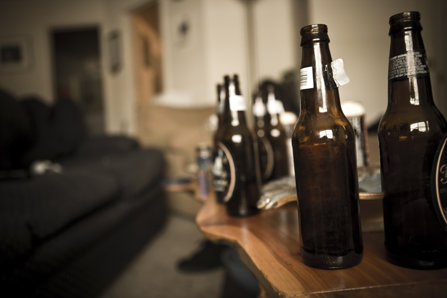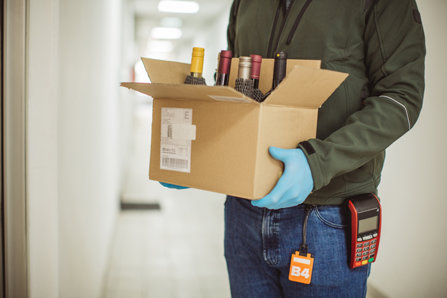Alcohol Consumption Soars During COVID-19

During a national health crisis such as the COVID-19 pandemic, tens of millions of Americans are faced with risks of contracting COVID, a highly contagious and potentially dangerous illness. And as the COVID crisis has developed across the U.S., “shelter-at-home” mandates have gone out and millions of Americans have found themselves stuck at home.
One of the unfortunate side effects of the health crisis has been an increase in alcohol consumption. Those who already struggle with alcohol misuse have fallen further into their addictions, and others have found themselves tempted by boredom, stress, and ease of access to alcohol due to online ordering and home delivery. The result? Alcohol consumption has increased during COVID-19.
Alcohol Sales on The Rise
Alcohol-related commerce has soared during the COVID-19 pandemic. According to the Associated Press, tequila sales rose 75 percent in March of 2020, canned cocktails went up 93 percent, and sales of wine and beer went up 66 percent and 42 percent, respectively.
The AP also focused on how alcohol sales went up. Drizly, an online alcohol delivery provider, saw a 300 percent increase in sales during COVID-19. Winc, an online wine club, saw a 578 percent increase in member sign-ups in March.
Alcohol Companies Exacerbate the Issue by Lobbying for Reduced Restrictions
To make matters worse, alcohol manufacturers used the COVID-19 pandemic to lobby Congress to reduce restrictions on the sale and distribution of alcohol. During COVID-19, alcohol companies have worked hard to get Americans to order alcohol online and have it shipped. Alcohol companies have made it so that alcohol deliveries went not to alcohol retailers, but to the front doors of customers. No middle man, no licensed retailer checking IDs.
During COVID-19, all bets are off. Alcohol manufacturers are seeking to profit from the pandemic as much as possible. Lower restrictions on ordering alcohol via delivery combined with sheltering-at-home mandates were part of what caused soaring online alcohol sales during the pandemic.
For example, the Beer Institute, a national trade association for beer brewers, said in response to why it was encouraging online sales and home delivery (and the necessary reduction of restrictions to make those options more readily available): “Beer is uniquely posed to address the consumer need at this point in time of uncertainty about a public health crisis, uncertainty about an economic crisis. Beer in particular brings a little joy and a little normalcy to an otherwise fraught situation for people.”
That is entirely the wrong message. People shouldn’t be drinking at all during a health crisis, not drinking more!
Why Online Ordering and Home Delivery is Flawed (and Dangerous)

It doesn’t take much investigation to determine why online alcohol ordering and home delivery is seriously flawed. While there has been little research into online sales and home delivery in the United States, an Australian research project found that about one-third of customers did not have their IDs checked when alcohol delivery drivers came to their homes to drop off purchases.
The critical problem with buying alcohol online and having it delivered to one’s home is it opens the door for abuse of a substance that people should not be consuming. Online ordering and home delivery make it easier for underage folks to purchase alcohol and get away with it, since most online ordering platforms do not demand sufficient proof of one’s age during the purchasing process. Furthermore, alcohol delivery opens the door to all sorts of abuses. Young people could bribe the delivery driver or request that the driver leave the delivery on the doormat. (The Australian study found that about 24 percent of alcohol deliveries are left on the porches or in the mailboxes of recipients, with no actual contact between the delivery personnel and the customer.)
It’s unfortunate that COVID-19, a health pandemic, has created a series of circumstances in the U.S. where alcohol companies have made it easier for people to get alcohol; and to get a lot of it, further endangering their health.
A Look at the Statistics – Why Drinking Too Much is Harmful
There’s no question that any level of alcohol consumption has risk, and that risk is exponentially exacerbated the more one drinks. Most people understand that alcohol consumption presents a risk for misuse and that the only way to ensure that alcohol misuse does not occur is not to drink.
But what actually happens as a result of nationwide alcohol misuse in this country? Let’s take a look at the statistics on the issue.
- About 14.4 million Americans meet the criteria for alcohol addiction.
- About 26 percent of Americans over the age of 18 admit to binge drinking, which puts them at high risk of becoming addicts.
- When people drink too much, doing so brings on a whole slew of health problems. The ultimate result? In addition to people not living a high-quality, healthy life, about 88,000 people die every year as a direct result of alcohol misuse.
- Alcohol misuse is the third-leading cause of preventable death in the United States, after smoking and obesity.
- Alcohol misuse causes untold harm for people who don’t even drink to excess. Close to 10,000 people die from drunk driving accidents every year, many of whom are innocent motorists killed by drunk drivers.
- Alcohol misuse also has a highly toxic effect on human relationships. Alcohol misuse has been traced back to a considerable percentage of domestic abuse cases, with one in ten children growing up with at least one alcohol-addicted parent.
Multiplying the Danger – Alcohol Misuse During a Pandemic
Alcohol misuse, by itself, unleashes a whole plethora of harm. But alcohol misuse during a national health crisis is even worse. Alcohol misuse harms the immune system, making it more difficult for the individual to fend off illness. When people misuse alcohol during a global health pandemic, not only are they making it more likely that they’ll get sick, but they’re also increasing the risk for those around them.
“Clinicians have long observed an association between excessive alcohol consumption and adverse immune-related health effects such as susceptibility to pneumonia.”

Quoting researchers Sarkar, Phil, Jung, and Wang, who studied this subject extensively: “Clinicians have long observed an association between excessive alcohol consumption and adverse immune-related health effects such as susceptibility to pneumonia. In recent decades, this association has been expanded to a greater likelihood of acute respiratory stress syndromes (ARDS), sepsis, alcoholic liver disease (ALD), and certain cancers; a higher incidence of postoperative complications; and slower and less complete recovery from infection and physical trauma, including poor wound healing.”
Seeking Help for an Alcohol Addiction
Do you know someone who is struggling with a drinking problem? Perhaps a son, daughter, sibling, parent, grandparent, grandchild, or spouse? Or are you struggling?
Alcohol misuse is a growing crisis that causes untold harm for the addict and everyone around him. It often ends in death, as evidenced by its position as the third-leading cause of preventable death in the U.S. If you or someone you care about is struggling with a drinking problem, please seek help at a treatment center as soon as possible. Alcohol addiction is a horrible condition, but it can be treated. Please contact a rehab center today.
Sources:
- https://apnews.com/c5f7471e14f547a08c577a724c21f088
- https://movendi.ngo/news/2020/04/24/usa-big-alcohol-uses-covid-19-to-change-alcohol-laws/
- https://fare.org.au/wp-content/uploads/Alcohol-home-delivery-services.pdf
- https://www.niaaa.nih.gov/publications/brochures-and-fact-sheets/alcohol-facts-and-statistics
- https://www.ncbi.nlm.nih.gov/pmc/articles/PMC4590612/


 ®
®